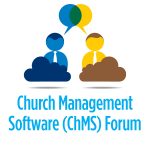

By Michael Jordan
While churches might have to be run like businesses, there are specific needs and flexibility which non-ChMS financial management applications just cannot provide. For some, the leading secular accounting software might be the answer — but we suggest otherwise. Here’s why.
Integration for a “whole-church” solution
Having an accounting module that integrates with your ChMS should be an essential item for churches. You should have a time-tested accounting module that can communicate directly with your congregation-facing software. Secular software, to current knowledge, does not integrate with any membership database or service. Having software that can “communicate” saves time, money and manpower.
 More detailed reporting, an audit trail and zero fraud
More detailed reporting, an audit trail and zero fraud
There are guidelines for reporting required of nonprofits. The standard advice is that all non-profits must be able to produce a balance sheet by fund and other financial statements. Although secular accounting software can provide you with a procedure for determining your fund balances, it cannot give you a Statement of Financial Position (balance sheet) by fund / class report.
In addition, it is imperative to have controls in place through your financial applications that allow for no alterations. For example, if you post an expense to the wrong account, a journal entry should be required to fix it, thereby creating an audit trail. In typical software, you have the option to turn off this feature, opening the invitation for fraud. This cannot happen with certain ChMS.
The heart and soul of church accounting
Church accounting software should be flexible and easy to use, with a double-entry accounting system that adheres to non-profit accounting standards and offers either a cash or accrual basis.
It is imperative to be able to create a unique chart of accounts for your church that can interface with all the other financial modules (as well as people modules) and specific church-related features offered through church ChMS (such as those provided by ACS Technologies). By being able to interface, you can track budgets and spending by fund, department, committee and project.
Budgeting and reporting shouldn’t have to be a chore. Things to look for when researching ChMS options include security, accuracy, flexibility, system-wide data integration, built-in Automated Clearing House (ACH) option, Microsoft Excel interface capabilities, and the abilities to keep track of what your church owes and pay your bills on time.
Your church software should be the church’s complete check-writing and vendor management program. It should have a sound accounts payable application that can save you time and coordinate the way church staff pay bills and issue 1099s. It should also be able to centrally process your outgoing funds, print checks, store vendor information, and keep track of your invoices.
In short, if you’re transferring funds or documents anywhere, it should flow through your ChMS.
Save valuable time and avoid confusion by handling all types of payroll procedures with one central solution
Financial management software (especially through a ChMS) normally handles the specific needs of churches and pastors, from housing allowances to insurance. It should also be able to accommodate multiple cost centers, so payment is charged to the appropriate areas. With a dedicated ChMS, your church can customize with additions and deductions to pay. In addition, with the proper software, you’ll have everything you need to pay church employees with consistency and accuracy.
The ChMS you choose should be able to provide: multiple cost centers; customize additions and deductions; print W2s & 941s; direct deposits; track vacation, sick and leave; Federal and State tax e-Filing; and the tools you need to help manage your spending.
Purchase orders are another key component to a good financial management application. To help prevent overspending, it’s imperative to have a system that allows for the automation of your church’s cash-flow planning process. It should also be able to help you easily cross-check and reference your purchasing.Keys here include: manage cash-flow and spending; automate spending plan; cross-check purchase; and set spending alerts.
A reliable, centralized asset inventory and management system
Financial management doesn’t end with dollars and cents, though; good ChMS needs to include a central inventory system for managing your organization’s equipment. A strong fixed assets component to your ChMS tracks specific asset details, from acquisition, to depreciation, to maintenance. It is important to have this when your church needs to budget, document insurance claims and / or generally support good stewardship of plans and property.
Effectively manage your outgoing billings and incoming payments
Whether on a cash or accrual basis, a solid accounts receivable program should automatically integrate with every single other aspect of your ChMS and accounting software modules. With a customized, unlimited revenue center, you can ensure accurate posting to the correct accounts, billing codes that offer easy handling of recurring invoices to given customers, and payment codes that enable efficient crediting of payments for multiple accounts at one time. It should also allow you to create unlimited revenues and connect income to specific accounts.
In short, unlimited charge items — with customized frequencies — mean fast and accurate billing. Using process automation will enable you to quickly produce batch invoices. Keys here include: define an unlimited number of revenues; customized income frequencies; batch invoicing; unlimited charge items; and process automation.
It’s about accountability, not just accounting
The key behind the importance in the Great Commission was not to go make disciples for a day, a year or a decade, but a lifetime.
By fostering a healthy, productive and influential church, choosing the right tools to help your church minister and grow is imperative to reaching this goal.
Michael Jordan is a marketing strategist for ACS Technologies headquartered in Florence, SC, with offices in Phoenix and Seattle.



Allowing some genuine consideration, concerning precisely where your hotel accommodation is, compared to exactly where any appointments etc you will have while you are visting a particular area or region, will help make ones total visit, much less stressful!